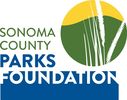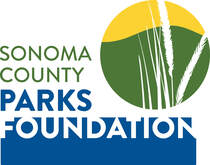Our community will continue to come together to support the parks
When past wildfires raged throughout Sonoma County, our parks played a critical role, giving first responders space to control the advancing flames.
As parks managers recognize these fires are now recurring incidents, rather than just replacing fire-damaged infrastructure with the same materials, Sonoma County Regional Parks is leading a fundamental shift to building with climate adaptive strategies.
In fire-damaged parks like Foothill Regional Park, climate adaptive strategies have involved replacing vulnerable infrastructure with fire-resilient materials. For example, wooden retaining walls were replaced with stone, and the backcountry wooden bridge will be
supplanted with a steel span.
Hood Mountain was scheduled to experience capital improvements prior to the 2020 Glass Fire, including four new restrooms funded through Measure M. Park planners now will build those restrooms with an eye towards fire resilience, such as water catchment and fire tool storage. Measure M funds will be augmented with Parks Foundation support to build a restroom that not only survives wild or prescribed fires, but also supports firefighting efforts.
The Parks Foundation’s Fire Recovery and Resilience Fund also can help Regional Parks heavily invest in efforts that protect our community in the future, including prescribed fire, construction of shaded fuel breaks at park perimeters of parks, and reduction of fire fuels. Early detection and response can stop small hot spots from erupting into dangerous conflagrations. Equipping park rangers with thermal imaging equipment, “water wagons,” backpack water pumps and other tools prepares them to address flare-ups rapidly and effectively.
The Parks Foundation is deeply grateful to our donors for helping our Regional Parks become more resilient in the face of recurring fires and better protect our communities!
In fire-damaged parks like Foothill Regional Park, climate adaptive strategies have involved replacing vulnerable infrastructure with fire-resilient materials. For example, wooden retaining walls were replaced with stone, and the backcountry wooden bridge will be
supplanted with a steel span.
Hood Mountain was scheduled to experience capital improvements prior to the 2020 Glass Fire, including four new restrooms funded through Measure M. Park planners now will build those restrooms with an eye towards fire resilience, such as water catchment and fire tool storage. Measure M funds will be augmented with Parks Foundation support to build a restroom that not only survives wild or prescribed fires, but also supports firefighting efforts.
The Parks Foundation’s Fire Recovery and Resilience Fund also can help Regional Parks heavily invest in efforts that protect our community in the future, including prescribed fire, construction of shaded fuel breaks at park perimeters of parks, and reduction of fire fuels. Early detection and response can stop small hot spots from erupting into dangerous conflagrations. Equipping park rangers with thermal imaging equipment, “water wagons,” backpack water pumps and other tools prepares them to address flare-ups rapidly and effectively.
The Parks Foundation is deeply grateful to our donors for helping our Regional Parks become more resilient in the face of recurring fires and better protect our communities!
Regional Parks provide a vital resource for our community, giving fire survivors − and all residents impacted by the fires − a peaceful place to escape stress, breathe fresh air, and relax in nature. Your donation today will support additional opportunities for the parks to restore us, just as we are working to restore the parks.




